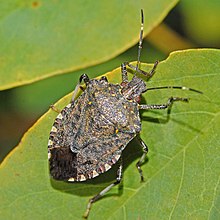The samurai wasp, an organism new to New Zealand, can now be used to fight any invasion by the brown marmorated stink bug, following a decision by the Environmental Protection Authority.
This wasp is a natural enemy of the stink bug.
The Brown Marmorated Stink Bug Council applied for approval to release the new organism, saying the stink bug poses one of the highest risk biosecurity threats to New Zealand. It noted that if the stink bug successfully breaches the country’s biosecurity system and establishes, it would be very hard to eradicate.
The council includes groups representing the avocado, apple and pear, kiwifruit, tomato, vegetable, and wine industries, and the Ministry for Primary Industries. It noted that in the USA and Europe, the stink bug has caused severe economic damage to horticultural crops, and has invaded homes during the cold winter months.
After a public hearing and consideration of 69 submissions, 65 of which supported the application, the authority approved the application, subject to a range of controls. Only the Ministry for Primary Industries) and its appointed agents may evoke the approval, because it is responsible for managing incursion responses and has the requisite expertise.
The samurai wasp may only be released in New Zealand after a stink bug invasion has been detected, and only at the location of the incursion. Before any conditional release is made MPI, in conjunction with the Brown Marmorated Stink Bug Council, must submit a Response Readiness Plan to us.
This must provide verification of the incursion and how the conditions imposed for any release will be met. The plan must be reviewed and resubmitted within three years.
Any EPA approval to release the samurai wasp will expire after 10 years but may be extended.
In considering the application, the authority considered whether the samurai wasp might displace any native species or harm natural habitats. It also assessed the possibility of adverse effects on human health and safety, and on New Zealand’s genetic diversity.
The authority heard from several grower organisations and individual growers about the potential impact the brown marmorated stink bug might have on their industries and livelihoods. It noted that many horticultural industries rely on integrated pest management practice or the use of softer chemicals for pest control
A broad incursion by the brown marmorated stink bug would lead to widespread use of broad-spectrum agrichemicals, which are likely to adversely affect sustainable practices and access to export markets, the authority noted.
Source: Environmental Protection Authority












